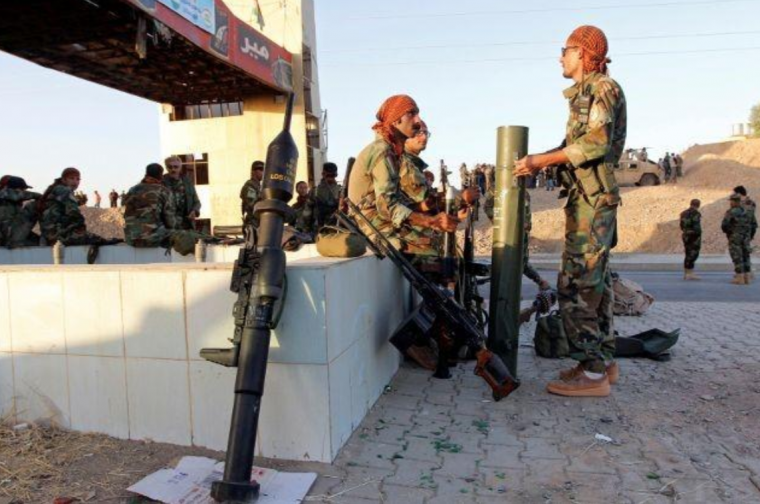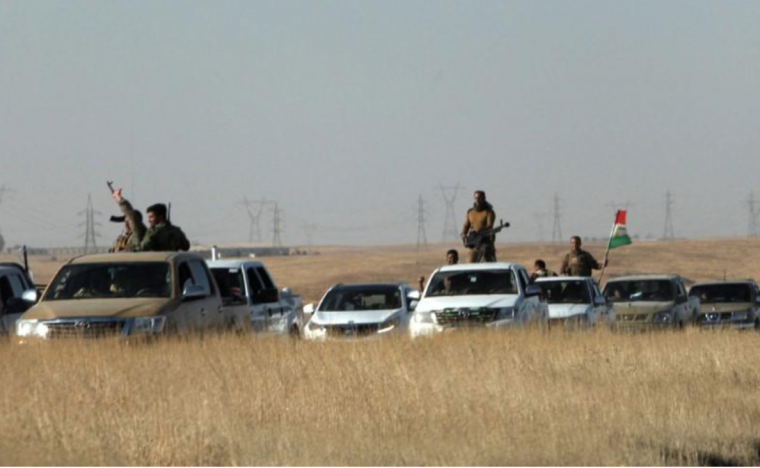In Kirkuk, Kurds' joy turns to fear after Iraqi army takeover
Turkmen and Arab shoppers stroll through an open-air food market in an ethnically mixed area of Kirkuk, haggling over the price of tomatoes and gossiping about their neighbours.
Ostensibly, it's a normal day in the city of 1 million in northern Iraq. But nearby stand Iraqi Army soldiers, sent by the central government in Baghdad this week to wrest control of the city from Kurds after their vote for independence on September 25.

The army's recapture of oil-producing Kirkuk province and other territory across northern Iraq has dismayed the city's Kurds but brought comfort to residents from other ethnic groups.
'Of course things are better now that the Iraqis have taken back the city,' said Mohammad, a Turkmen butcher grinning over a large pile of ground meat. 'We're all brothers, but at the end of the day, Kirkuk is not for the Kurds. It's for Iraq.'
An Arab couple who have seen Kirkuk change hands several times before said they now feel safer and more comfortable.
'This is our city after all,' said the elderly Hajji Ahmed.
Across the street in a Kurdish-owned restaurant, the mood is different.
'None of my Kurdish regulars want to come to eat here any more, they don't feel safe,' said the owner, who asked not to be named for fear of retaliation. 'We're all afraid because our fate in the city is unknown.'
Thousands of people fled Kirkuk after rumours of looting and violence against Kurds spread on social media, though residents said many later returned. No one Reuters spoke to had witnessed or suffered any aggression.
'Lost forever'
The scenes now are a far cry from the Kurds' jubilation on the day of the independence referendum, when they danced and sang in the streets.
Though the referendum was opposed by international allies, Kurdistan Regional Government (KRG) President Massoud Barzani was confident its outcome would give his government leverage to negotiate secession.
Kirkuk is seen by many Kurds as the future capital of an independent Kurdish state. Including it in the referendum was widely seen as a unilateral move to consolidate Kurdish control.

Peshmerga fighters seized Kirkuk in 2014 after Iraqi security forces fled, leaving the region's oilfields vulnerable to Islamic State militants who had swept across northern Iraq.
But any notion of consolidated Kurdish power was quashed on Monday when Kurdish forces quietly withdrew, allowing the Iraqis to retake the city and other disputed territories claimed by both the central government in Baghdad and the Kurds.
Kurdish flags used to hang from street lamps and buildings across the whole city but are now seen only in Kurdish areas. Roadside vendors now sell the flags of the Iraqi army and Shi'ite paramilitary forces.
'Kirkuk has been lost forever,' said a Kurdish resident of the Shorja district.
Feelings of betrayal
Kurds in Kirkuk feel betrayed by their political leaders and humiliated by Baghdad, which forcibly displaced them from the city under late dictator Saddam Hussein.
Some civilians are now deployed along the highway to the regional capital, Erbil, with Kurdish Peshmerga fighters.
'We brought our guns to defend against the Iraqi invaders,' said one, a retired Peshmerga fighter. 'We were betrayed, even by our own political leaders. So we had to come with our weapons to fight.'
The men have built berms and road blocks to slow traffic into the small town of Altun Kupri, or Perde in Kurdish.
'Now we only have orders to defend. But if they try and come to Erbil, we will attack them ferociously. We have to protect our people,' Bakr Razgai, a local commander, said before clashes in the area on Friday morning.
Such bravado was hard to find in Kirkuk.
In the Kurdish neighbourhood of Shorja, a poster hanging in front of the main market and showing late Kurdish leader Jalal Talabani's face next to a Kurdish flag has been scribbled over.
'I've been up every night since Monday, afraid for my life,' said Abdullah, a Kurdish clothes salesman.
A friend said this was because of propaganda on social media and asked him if he had seen anything bad happen.
Abdullah had not. 'But I'm still afraid,' he said.











